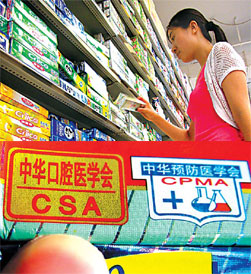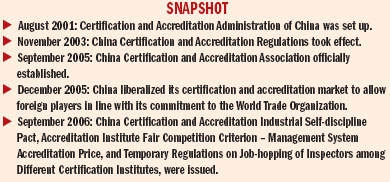


Unlike other business sectors in China that have seen fiercer competition between domestic and foreign players ever since the nation began to liberalize its economy, local and overseas agencies in the certification and verification field not only have their individual, exclusive clientele but also seek cooperation with one another to complement their advantages.
According to industry watchdog Certification and Accreditation Administration of China (CAAC), there are 144 legal domestic and 12 overseas verification institutes, certification training agencies and representative offices on the mainland.
The certification and verification market in China has emerged since the 1990s in tandem with the rapid economic development, opening up of the market and growth of foreign trade. While transnational certification giants, such as System & Services Certification (SGS), Det Norske Veritas (DNV) and Business Standard International (BSI) entered the market following their global clients, their local counterparts grew as more and more Chinese companies began to eye the overseas market and began to look for certification for legitimacy in unknown terrains.

"It's obvious that foreigners are occupying the niche and high-end sector while the local agencies are in firm control of the mass market," says Li Xuan, a professor with the Central University of Finance and Economics.
But the brisk pace of market expansion in China has opened up new opportunities for both domestic and foreign players, increasingly pushing them toward collaboration.
China has developed into the second largest inspection and verification market in the world after the United States, says Yu Hui, a researcher with the Institute of Industrial Economics affiliated to the Chinese Academy of Social Sciences.
By the end of June, domestic and foreign verification agencies issued over 390,000 certificates on both system management and product quality. China produces the highest number of product quality certificates in the world. Professional certification laboratories, which are specifically used to test product quality and safety, have crossed 2,600 in China, making the country a global player in this segment.
China started to marketize its certification sector in the 1990s. Before market reforms, industrial authorities were responsible for certification. In the mid-1990s, certification institutes were separated from industrial authorities to become independent agencies.
It was in 2001 that CAAC was established to supervise the market. To enhance self-discipline and promote an industrial overhaul, China Certification and Accreditation Association (CCAA) was officially launched in 2005.
A group of State-owned certification giants, such as China Quality Certification Center (CQC), China Quality Mark Certification Group and China Great Wall Quality Assurance Center, are in charge of China Compulsory Certification and other national verification programs of management systems, product quality and commodity safety.
Price war
Small and medium-sized verification institutes are thriving on competitive inspection fees, offering flexible operations and tailored services. Transnational behemoths, on the other hand, have chosen a slow and steady growth path in the Chinese market.
Mandate rate, or fees in certification lingo, of multinationals is higher than their local peers, usually nearly double, as MNCs maintain parity between their local and global rates. Mandate rate specifically refers to unit price per person per day. The fee is charged depending on how many inspectors take how many days to complete a certification project.
Though the charge is much higher, businesses sometimes have to turn to foreign agencies because international certifications are compulsory for exporters and some foreign certification agencies dominate the market in certain specific areas, says researcher Yu.
Take European Certifying Organization as an example. The institute is a third-party notified body authorized directly by the European Commission and specializes in CE (European Conformity) certification. All Chinese products exported to Europe require to be certified by this specific institute.
As for DNV, since the CO2 emission assessment standards are set by the Norway-based certification agency itself, clients prefer to get the certificate directly from the founder. Almost 80 percent of China's CO2 emission assessment market is occupied by this agency.
In addition, foreign certifying agencies' long history, worldwide reputation and client network add to their status.
"Currently, the most serious competition is among local small and medium-sized agencies," says Professor Li, adding the common tool for competition among these players is price, or discounted mandate rate.
To regulate the market and guarantee fair competition, CAAC has promulgated the minimum mandate rate should be 3,000 yuan in China. The authorities are also working hard to counter illegal certification agencies. CAAC and CCAA have joined forces to clean the market of these unsavory elements.
In January, CAAC declared five certification institutes as illegal and abolished them. Another 11 are under investigation.
A marketing official of CCAA, who prefers not to be named, reveals that for a company with 300 employees, a certification project should be completed by three people in 10 days. If the mandate rate is 3,000 yuan, the agency earns 90,000 yuan. And that's just for a small company. For large businesses, verification charges for one certificate might cost millions of yuan.
"Enterprises commonly get more than one certificate, from compulsory ones such as CCC to voluntary ones like ISO14000. In a competitive market, companies seek certificates to jazz up their brands," says the official.
Many new standards have developed because of social and economic development. Also, certificates are not for life and need to be regularly renewed, creating a huge market for the industry. "The certification and verification industry is an unlimited and the promising sector," the official points out.
So enticing is the market that domestic and foreign players are now looking to join forces to complement each other's strengths. SAI Global Ltd, an Australian service provider in standards, compliance and business improvement solutions, in October established a 50-50 joint venture, CQC-SAI Management Technologies (Beijing), with CQC, the country's largest certification body.
Market access
The firm provides services to Chinese enterprises seeking to access international markets and connect overseas sellers to the Chinese market. It focuses on four areas: management system certification, product certification, compliance services and training.
"CQC represents independence and impartiality, standards and precision, high quality and efficiency," SAI Global Limited Chairman George Edwards says. "SAI Global represents innovation and quality, education and knowledge, safety and security."
Suzhou University and Intertek, a British chemical testing and registration service, set up China's first testing and certification center for chemicals - Chemical Safety Evaluation and Research Center (CSERC) - in June, specializing in helping local manufacturers meet new European Union (EU) requirements.
"Intertek's global resources can help us fulfill the EU registration requirements but at the same time offer a much lower price (than EU agencies), thanks to its localized operation," says Shen Qi, CEO of Jiangsu Yoke Chemical Co, which exports about 30 million euros of chemicals to Europe every year.
In addition to joint ventures, some foreign agencies, based on their talent pool and experience, collaborate with national authorities to carry out research and development of new standards that are not only in line with international demands but also meet local conditions.
"The strategy will help them maintain their dominant positions in specific fields and facilitate their sustainable development," says Yu.
(China Daily 09/10/2007 page1)













